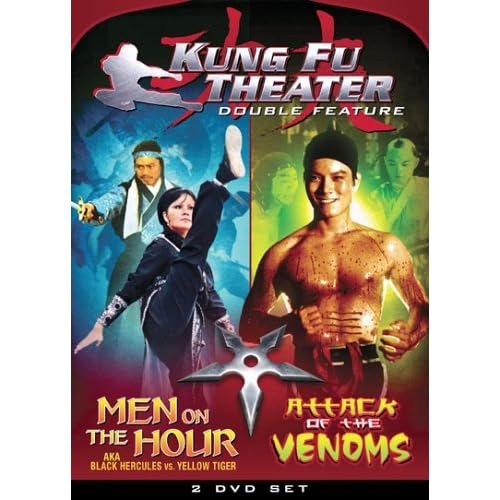 I remember waiting for a DVD copy of Attack of the Joyful Goddess to surface in the market, because back when I first began collecting I was a more frugal and suspicious of online retailers than I am now. It eventually came in the form of a 2-disc set with Men on the Hour, a film starring Pearl Cheung (though she’s really not in it enough) and a death trap filled tower. I didn’t realize that a clean, widescreen print of Men on the Hour should have surprised and excited me; I was only too happy to finally see Attack of the Joyful Goddess. Why was I so excited for this movie? Look at the name.
I remember waiting for a DVD copy of Attack of the Joyful Goddess to surface in the market, because back when I first began collecting I was a more frugal and suspicious of online retailers than I am now. It eventually came in the form of a 2-disc set with Men on the Hour, a film starring Pearl Cheung (though she’s really not in it enough) and a death trap filled tower. I didn’t realize that a clean, widescreen print of Men on the Hour should have surprised and excited me; I was only too happy to finally see Attack of the Joyful Goddess. Why was I so excited for this movie? Look at the name.Like seemingly every Chang Cheh film from around this time, Attack of the Joyful Goddess opens with a demo against an empty sound stage. Unlike most of Chang’s films, actors in full opera make-up and attire perform the opening sequence, in which a chicken is sacrificed among all of the flipping and weapon handling. A narrator explains backstage rituals of Chinese Opera, allowing the viewer who isn’t deeply familiar with Chinese theater and religious conventions some context for all of the supernatural events in the film.
I won’t speak at length about the plot for a couple of reasons. Firstly, the real fun of this movie comes from the almost unpredictable -- although never actually scary -- interventions of ghosts, spirits, and Joy Gods. The second reason is because this film suffers the same ignoble dubbing as Nine Demons. The English script coins names such as “Handsome” and “Rainbow” for its characters and the actors don’t manage much in the way of inflection, much less emotion or character. The dub team did almost as poor a job on this film as they did with Nine Demons, which is especially sad since there was much more to work with in this film. In fact, the title itself is a misnomer, as the titular character is not a goddess, but a god, the deified spirit of a boy emperor who crawled into a costume trunk during an opera performance and suffocated. Who is responsible for the gender confusion? The dub at least refers to the “Joy God.”

If anything must be said, it is this; this is Chang’s talkiest movie since the trouble-youth pics he made for Shaw Brothers before his first sojourn to Taiwan in the mid-seventies. This baffled me the first time I watched it. When the leading man in the troupe finds out that the director actually wants to prostitute his sweetheart, the show’s leading female, to the local magistrate, I expected to see a massive brawl in which the whole troupe would eventually start fighting. At least, that’s how it would’ve happened if this had been Magnificent Ruffians or Killer Army. Rather, threats are made and tensions mount, and when violence does break out, it’s quick and nasty and not choreographed like an opera scene. Characters act something closer to actual human beings in Attack of the Joyful Goddess than they do in most of Chang’s other films.
That’s not to say that the film is realistic. It is a film about supernatural revenge, after all. Chang really manages to escape the pitfalls of his other fantasy and opera based films by keeping the opera confined to the stage and the supernatural confined to quick bursts until the finale. Without even so much a budget as he had at Shaw Brothers, Chang and his co-directors (frequent stars and action choreographers Lu Feng and Chiang Sheng) rely on the same methods of representing the supernatural as they would in Nine Demons: jump cuts, colored disco lighting, wire work. Thankfully, all of this, along with pyrotechnics and cut-rate animation is saved, mostly, until the finale, in which all hell breaks loose. The finale, the only real action scene in the movie, is probably the wildest thing that Chang filmed after leaving Shaw Brothers, that brief period of working in the mainland included.
 I won’t try and claim that Attack of the Joyful Goddess is a misunderstood classic. It’s an above average film of its type and a more ambitious film than I first thought. It is, however, flatly shot and thematically weak. I also won’t pretend to understand the references to all of the operas the troupe performs, other than they seem to be performing shows portraying characters that would scare ghosts and demons. Still, unlike Nine Demons, this film might actually be decent if seen as it was originally intended, in its original aspect ratio and language.
I won’t try and claim that Attack of the Joyful Goddess is a misunderstood classic. It’s an above average film of its type and a more ambitious film than I first thought. It is, however, flatly shot and thematically weak. I also won’t pretend to understand the references to all of the operas the troupe performs, other than they seem to be performing shows portraying characters that would scare ghosts and demons. Still, unlike Nine Demons, this film might actually be decent if seen as it was originally intended, in its original aspect ratio and language.Still, if you just want the wacky stuff, this isn’t really where it’s at (the ending excepted).

No comments:
Post a Comment